Organic City Cafe Business Plan
VerifiedAdded on 2020/04/15
|10
|1593
|73
AI Summary
The assignment evaluates the viability of launching an Organic City Café in South Australia. It examines the growing organic food sector in Australia, identifies market gaps in the region, and emphasizes the café's potential to attract customers through its fresh, diverse, and organic menu offerings.
Contribute Materials
Your contribution can guide someone’s learning journey. Share your
documents today.
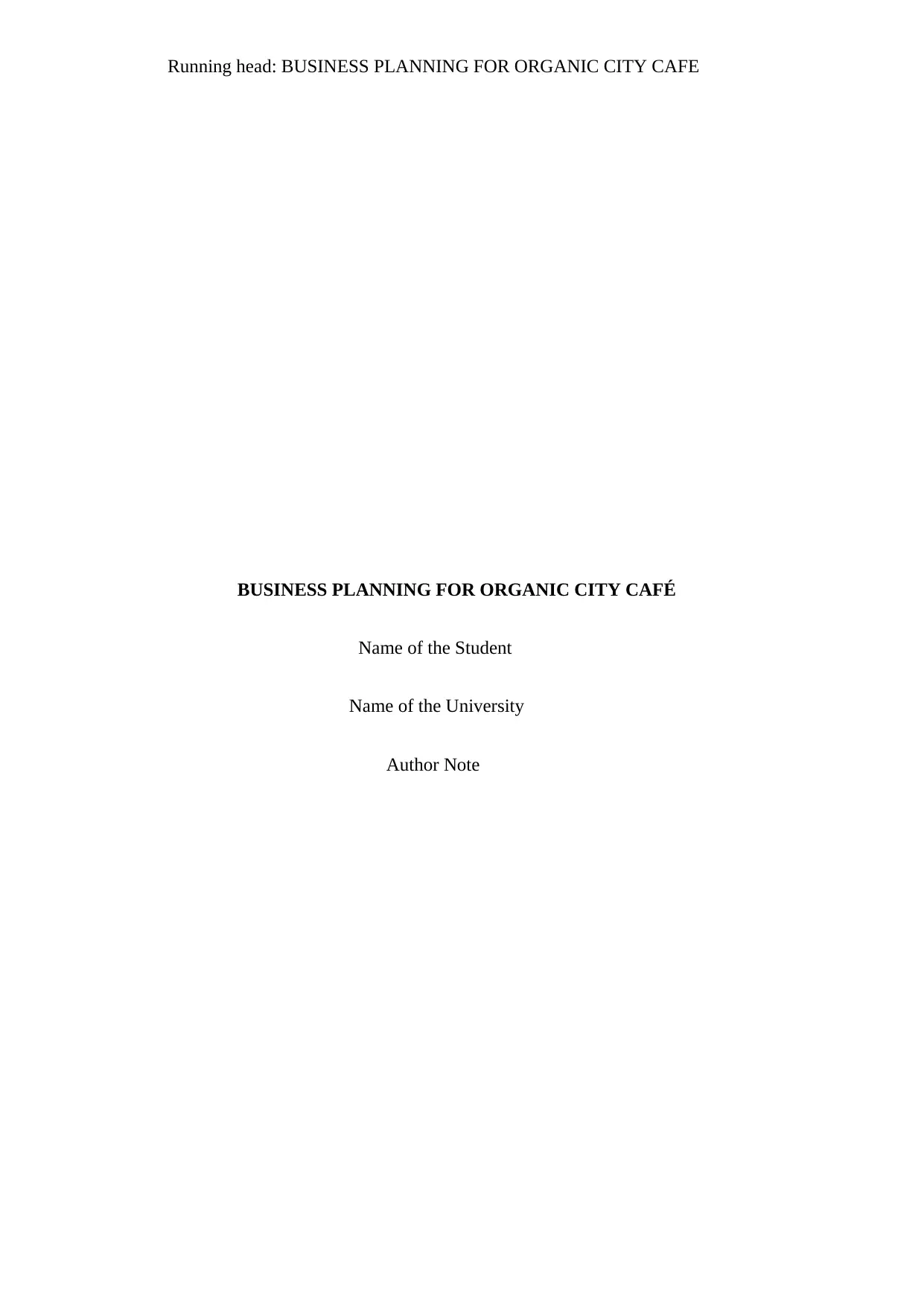
Running head: BUSINESS PLANNING FOR ORGANIC CITY CAFE
BUSINESS PLANNING FOR ORGANIC CITY CAFÉ
Name of the Student
Name of the University
Author Note
BUSINESS PLANNING FOR ORGANIC CITY CAFÉ
Name of the Student
Name of the University
Author Note
Secure Best Marks with AI Grader
Need help grading? Try our AI Grader for instant feedback on your assignments.
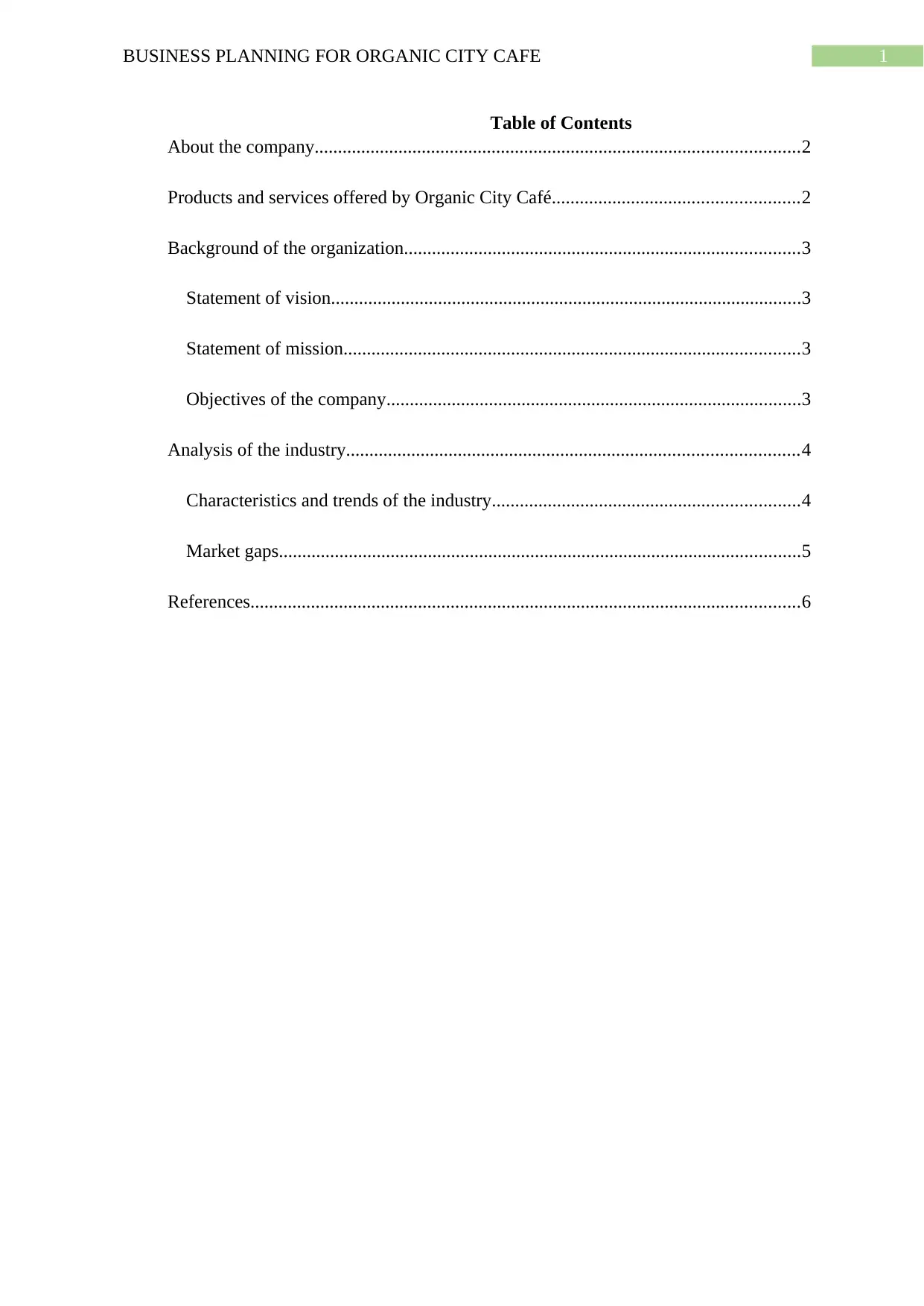
1BUSINESS PLANNING FOR ORGANIC CITY CAFE
Table of Contents
About the company........................................................................................................2
Products and services offered by Organic City Café.....................................................2
Background of the organization.....................................................................................3
Statement of vision.....................................................................................................3
Statement of mission..................................................................................................3
Objectives of the company.........................................................................................3
Analysis of the industry.................................................................................................4
Characteristics and trends of the industry..................................................................4
Market gaps................................................................................................................5
References......................................................................................................................6
Table of Contents
About the company........................................................................................................2
Products and services offered by Organic City Café.....................................................2
Background of the organization.....................................................................................3
Statement of vision.....................................................................................................3
Statement of mission..................................................................................................3
Objectives of the company.........................................................................................3
Analysis of the industry.................................................................................................4
Characteristics and trends of the industry..................................................................4
Market gaps................................................................................................................5
References......................................................................................................................6
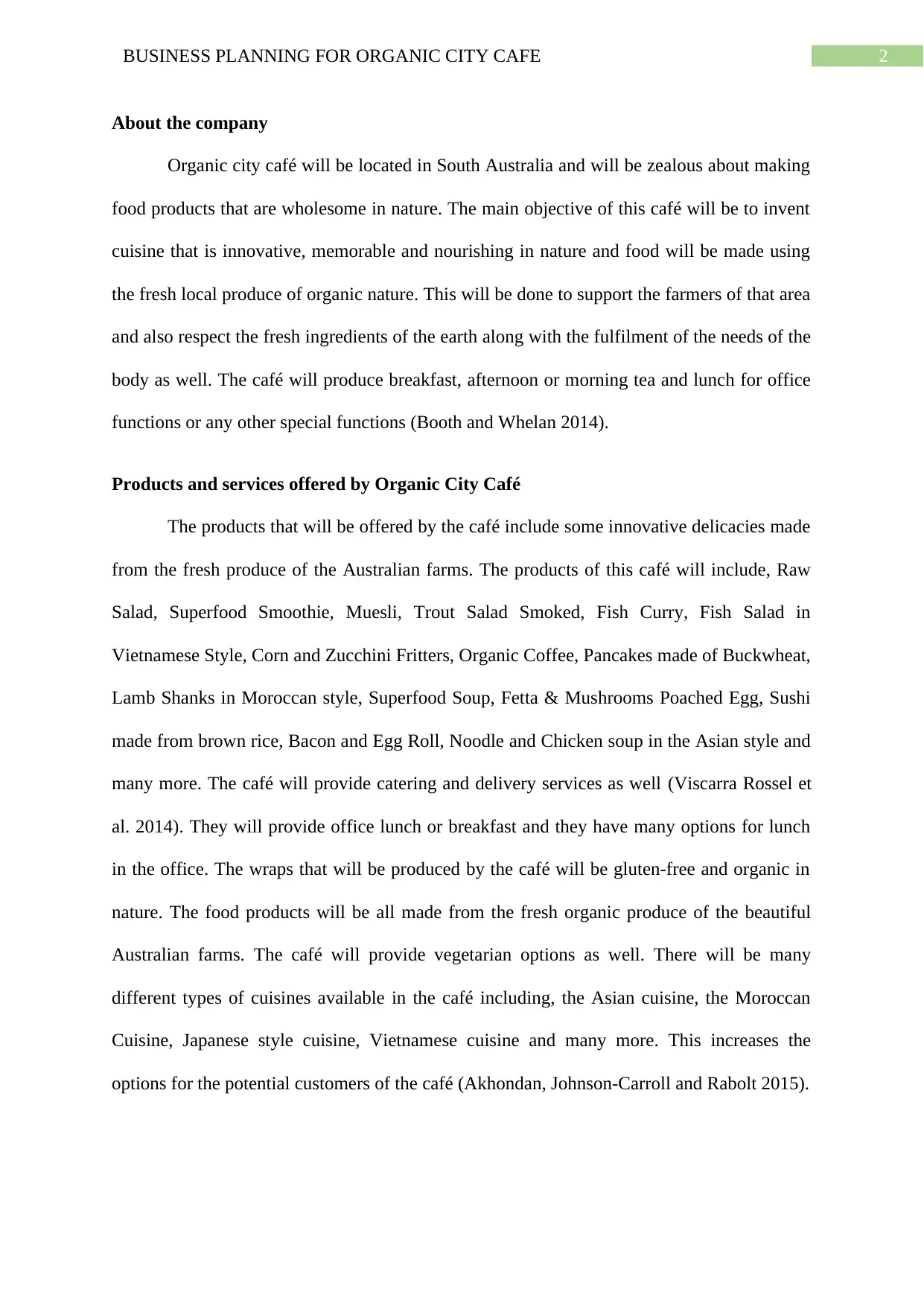
2BUSINESS PLANNING FOR ORGANIC CITY CAFE
About the company
Organic city café will be located in South Australia and will be zealous about making
food products that are wholesome in nature. The main objective of this café will be to invent
cuisine that is innovative, memorable and nourishing in nature and food will be made using
the fresh local produce of organic nature. This will be done to support the farmers of that area
and also respect the fresh ingredients of the earth along with the fulfilment of the needs of the
body as well. The café will produce breakfast, afternoon or morning tea and lunch for office
functions or any other special functions (Booth and Whelan 2014).
Products and services offered by Organic City Café
The products that will be offered by the café include some innovative delicacies made
from the fresh produce of the Australian farms. The products of this café will include, Raw
Salad, Superfood Smoothie, Muesli, Trout Salad Smoked, Fish Curry, Fish Salad in
Vietnamese Style, Corn and Zucchini Fritters, Organic Coffee, Pancakes made of Buckwheat,
Lamb Shanks in Moroccan style, Superfood Soup, Fetta & Mushrooms Poached Egg, Sushi
made from brown rice, Bacon and Egg Roll, Noodle and Chicken soup in the Asian style and
many more. The café will provide catering and delivery services as well (Viscarra Rossel et
al. 2014). They will provide office lunch or breakfast and they have many options for lunch
in the office. The wraps that will be produced by the café will be gluten-free and organic in
nature. The food products will be all made from the fresh organic produce of the beautiful
Australian farms. The café will provide vegetarian options as well. There will be many
different types of cuisines available in the café including, the Asian cuisine, the Moroccan
Cuisine, Japanese style cuisine, Vietnamese cuisine and many more. This increases the
options for the potential customers of the café (Akhondan, Johnson-Carroll and Rabolt 2015).
About the company
Organic city café will be located in South Australia and will be zealous about making
food products that are wholesome in nature. The main objective of this café will be to invent
cuisine that is innovative, memorable and nourishing in nature and food will be made using
the fresh local produce of organic nature. This will be done to support the farmers of that area
and also respect the fresh ingredients of the earth along with the fulfilment of the needs of the
body as well. The café will produce breakfast, afternoon or morning tea and lunch for office
functions or any other special functions (Booth and Whelan 2014).
Products and services offered by Organic City Café
The products that will be offered by the café include some innovative delicacies made
from the fresh produce of the Australian farms. The products of this café will include, Raw
Salad, Superfood Smoothie, Muesli, Trout Salad Smoked, Fish Curry, Fish Salad in
Vietnamese Style, Corn and Zucchini Fritters, Organic Coffee, Pancakes made of Buckwheat,
Lamb Shanks in Moroccan style, Superfood Soup, Fetta & Mushrooms Poached Egg, Sushi
made from brown rice, Bacon and Egg Roll, Noodle and Chicken soup in the Asian style and
many more. The café will provide catering and delivery services as well (Viscarra Rossel et
al. 2014). They will provide office lunch or breakfast and they have many options for lunch
in the office. The wraps that will be produced by the café will be gluten-free and organic in
nature. The food products will be all made from the fresh organic produce of the beautiful
Australian farms. The café will provide vegetarian options as well. There will be many
different types of cuisines available in the café including, the Asian cuisine, the Moroccan
Cuisine, Japanese style cuisine, Vietnamese cuisine and many more. This increases the
options for the potential customers of the café (Akhondan, Johnson-Carroll and Rabolt 2015).
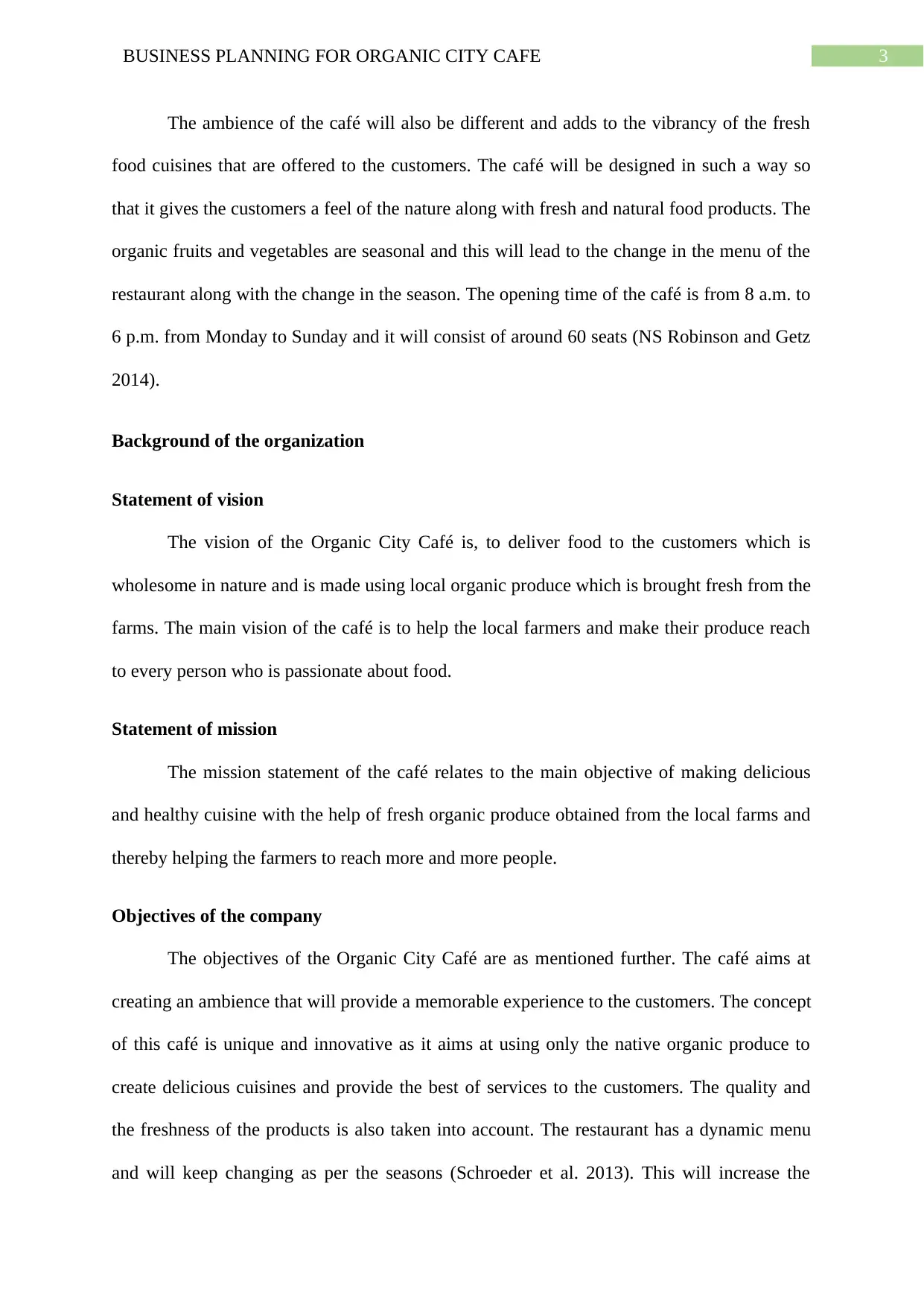
3BUSINESS PLANNING FOR ORGANIC CITY CAFE
The ambience of the café will also be different and adds to the vibrancy of the fresh
food cuisines that are offered to the customers. The café will be designed in such a way so
that it gives the customers a feel of the nature along with fresh and natural food products. The
organic fruits and vegetables are seasonal and this will lead to the change in the menu of the
restaurant along with the change in the season. The opening time of the café is from 8 a.m. to
6 p.m. from Monday to Sunday and it will consist of around 60 seats (NS Robinson and Getz
2014).
Background of the organization
Statement of vision
The vision of the Organic City Café is, to deliver food to the customers which is
wholesome in nature and is made using local organic produce which is brought fresh from the
farms. The main vision of the café is to help the local farmers and make their produce reach
to every person who is passionate about food.
Statement of mission
The mission statement of the café relates to the main objective of making delicious
and healthy cuisine with the help of fresh organic produce obtained from the local farms and
thereby helping the farmers to reach more and more people.
Objectives of the company
The objectives of the Organic City Café are as mentioned further. The café aims at
creating an ambience that will provide a memorable experience to the customers. The concept
of this café is unique and innovative as it aims at using only the native organic produce to
create delicious cuisines and provide the best of services to the customers. The quality and
the freshness of the products is also taken into account. The restaurant has a dynamic menu
and will keep changing as per the seasons (Schroeder et al. 2013). This will increase the
The ambience of the café will also be different and adds to the vibrancy of the fresh
food cuisines that are offered to the customers. The café will be designed in such a way so
that it gives the customers a feel of the nature along with fresh and natural food products. The
organic fruits and vegetables are seasonal and this will lead to the change in the menu of the
restaurant along with the change in the season. The opening time of the café is from 8 a.m. to
6 p.m. from Monday to Sunday and it will consist of around 60 seats (NS Robinson and Getz
2014).
Background of the organization
Statement of vision
The vision of the Organic City Café is, to deliver food to the customers which is
wholesome in nature and is made using local organic produce which is brought fresh from the
farms. The main vision of the café is to help the local farmers and make their produce reach
to every person who is passionate about food.
Statement of mission
The mission statement of the café relates to the main objective of making delicious
and healthy cuisine with the help of fresh organic produce obtained from the local farms and
thereby helping the farmers to reach more and more people.
Objectives of the company
The objectives of the Organic City Café are as mentioned further. The café aims at
creating an ambience that will provide a memorable experience to the customers. The concept
of this café is unique and innovative as it aims at using only the native organic produce to
create delicious cuisines and provide the best of services to the customers. The quality and
the freshness of the products is also taken into account. The restaurant has a dynamic menu
and will keep changing as per the seasons (Schroeder et al. 2013). This will increase the
Secure Best Marks with AI Grader
Need help grading? Try our AI Grader for instant feedback on your assignments.
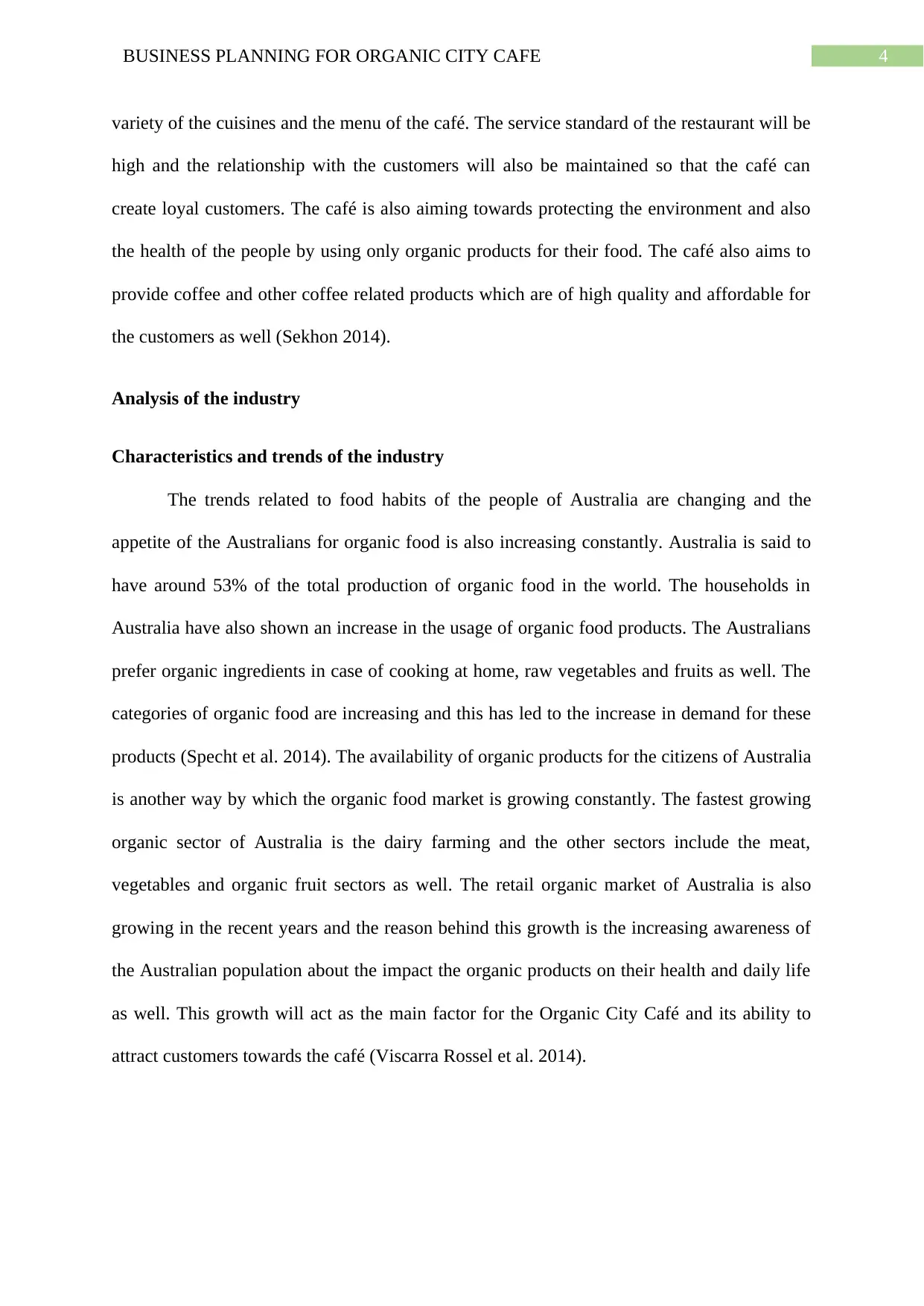
4BUSINESS PLANNING FOR ORGANIC CITY CAFE
variety of the cuisines and the menu of the café. The service standard of the restaurant will be
high and the relationship with the customers will also be maintained so that the café can
create loyal customers. The café is also aiming towards protecting the environment and also
the health of the people by using only organic products for their food. The café also aims to
provide coffee and other coffee related products which are of high quality and affordable for
the customers as well (Sekhon 2014).
Analysis of the industry
Characteristics and trends of the industry
The trends related to food habits of the people of Australia are changing and the
appetite of the Australians for organic food is also increasing constantly. Australia is said to
have around 53% of the total production of organic food in the world. The households in
Australia have also shown an increase in the usage of organic food products. The Australians
prefer organic ingredients in case of cooking at home, raw vegetables and fruits as well. The
categories of organic food are increasing and this has led to the increase in demand for these
products (Specht et al. 2014). The availability of organic products for the citizens of Australia
is another way by which the organic food market is growing constantly. The fastest growing
organic sector of Australia is the dairy farming and the other sectors include the meat,
vegetables and organic fruit sectors as well. The retail organic market of Australia is also
growing in the recent years and the reason behind this growth is the increasing awareness of
the Australian population about the impact the organic products on their health and daily life
as well. This growth will act as the main factor for the Organic City Café and its ability to
attract customers towards the café (Viscarra Rossel et al. 2014).
variety of the cuisines and the menu of the café. The service standard of the restaurant will be
high and the relationship with the customers will also be maintained so that the café can
create loyal customers. The café is also aiming towards protecting the environment and also
the health of the people by using only organic products for their food. The café also aims to
provide coffee and other coffee related products which are of high quality and affordable for
the customers as well (Sekhon 2014).
Analysis of the industry
Characteristics and trends of the industry
The trends related to food habits of the people of Australia are changing and the
appetite of the Australians for organic food is also increasing constantly. Australia is said to
have around 53% of the total production of organic food in the world. The households in
Australia have also shown an increase in the usage of organic food products. The Australians
prefer organic ingredients in case of cooking at home, raw vegetables and fruits as well. The
categories of organic food are increasing and this has led to the increase in demand for these
products (Specht et al. 2014). The availability of organic products for the citizens of Australia
is another way by which the organic food market is growing constantly. The fastest growing
organic sector of Australia is the dairy farming and the other sectors include the meat,
vegetables and organic fruit sectors as well. The retail organic market of Australia is also
growing in the recent years and the reason behind this growth is the increasing awareness of
the Australian population about the impact the organic products on their health and daily life
as well. This growth will act as the main factor for the Organic City Café and its ability to
attract customers towards the café (Viscarra Rossel et al. 2014).
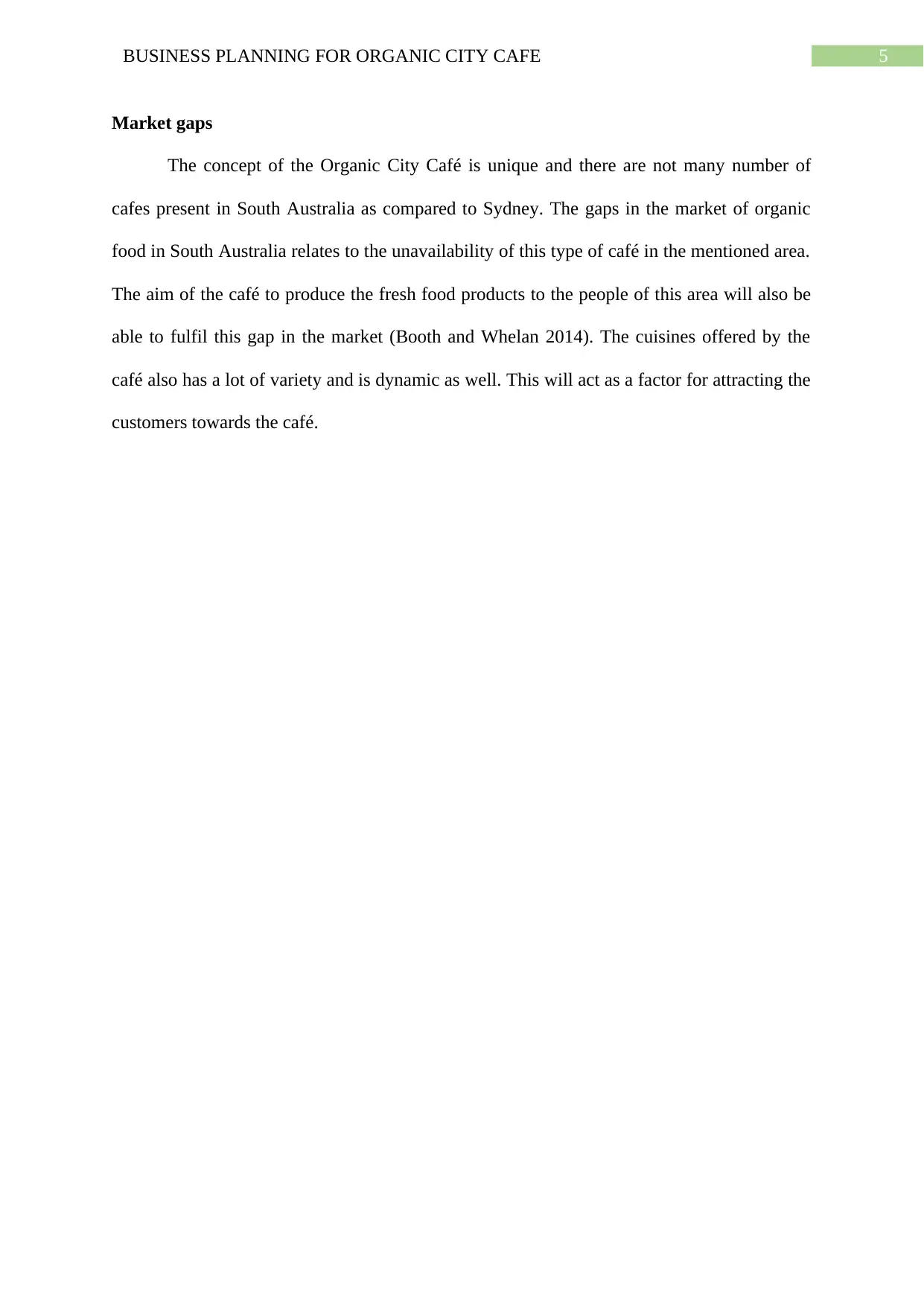
5BUSINESS PLANNING FOR ORGANIC CITY CAFE
Market gaps
The concept of the Organic City Café is unique and there are not many number of
cafes present in South Australia as compared to Sydney. The gaps in the market of organic
food in South Australia relates to the unavailability of this type of café in the mentioned area.
The aim of the café to produce the fresh food products to the people of this area will also be
able to fulfil this gap in the market (Booth and Whelan 2014). The cuisines offered by the
café also has a lot of variety and is dynamic as well. This will act as a factor for attracting the
customers towards the café.
Market gaps
The concept of the Organic City Café is unique and there are not many number of
cafes present in South Australia as compared to Sydney. The gaps in the market of organic
food in South Australia relates to the unavailability of this type of café in the mentioned area.
The aim of the café to produce the fresh food products to the people of this area will also be
able to fulfil this gap in the market (Booth and Whelan 2014). The cuisines offered by the
café also has a lot of variety and is dynamic as well. This will act as a factor for attracting the
customers towards the café.
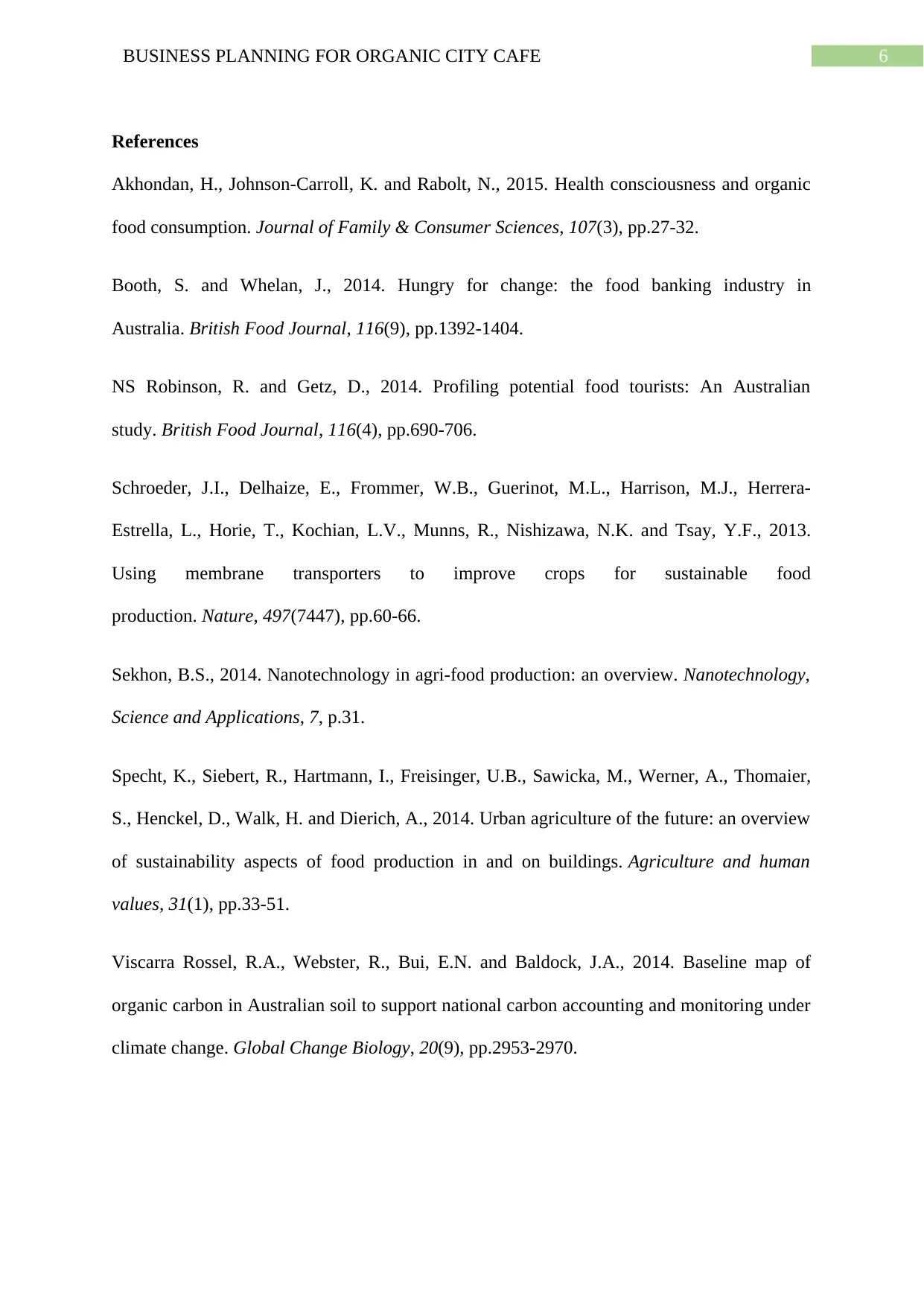
6BUSINESS PLANNING FOR ORGANIC CITY CAFE
References
Akhondan, H., Johnson-Carroll, K. and Rabolt, N., 2015. Health consciousness and organic
food consumption. Journal of Family & Consumer Sciences, 107(3), pp.27-32.
Booth, S. and Whelan, J., 2014. Hungry for change: the food banking industry in
Australia. British Food Journal, 116(9), pp.1392-1404.
NS Robinson, R. and Getz, D., 2014. Profiling potential food tourists: An Australian
study. British Food Journal, 116(4), pp.690-706.
Schroeder, J.I., Delhaize, E., Frommer, W.B., Guerinot, M.L., Harrison, M.J., Herrera-
Estrella, L., Horie, T., Kochian, L.V., Munns, R., Nishizawa, N.K. and Tsay, Y.F., 2013.
Using membrane transporters to improve crops for sustainable food
production. Nature, 497(7447), pp.60-66.
Sekhon, B.S., 2014. Nanotechnology in agri-food production: an overview. Nanotechnology,
Science and Applications, 7, p.31.
Specht, K., Siebert, R., Hartmann, I., Freisinger, U.B., Sawicka, M., Werner, A., Thomaier,
S., Henckel, D., Walk, H. and Dierich, A., 2014. Urban agriculture of the future: an overview
of sustainability aspects of food production in and on buildings. Agriculture and human
values, 31(1), pp.33-51.
Viscarra Rossel, R.A., Webster, R., Bui, E.N. and Baldock, J.A., 2014. Baseline map of
organic carbon in Australian soil to support national carbon accounting and monitoring under
climate change. Global Change Biology, 20(9), pp.2953-2970.
References
Akhondan, H., Johnson-Carroll, K. and Rabolt, N., 2015. Health consciousness and organic
food consumption. Journal of Family & Consumer Sciences, 107(3), pp.27-32.
Booth, S. and Whelan, J., 2014. Hungry for change: the food banking industry in
Australia. British Food Journal, 116(9), pp.1392-1404.
NS Robinson, R. and Getz, D., 2014. Profiling potential food tourists: An Australian
study. British Food Journal, 116(4), pp.690-706.
Schroeder, J.I., Delhaize, E., Frommer, W.B., Guerinot, M.L., Harrison, M.J., Herrera-
Estrella, L., Horie, T., Kochian, L.V., Munns, R., Nishizawa, N.K. and Tsay, Y.F., 2013.
Using membrane transporters to improve crops for sustainable food
production. Nature, 497(7447), pp.60-66.
Sekhon, B.S., 2014. Nanotechnology in agri-food production: an overview. Nanotechnology,
Science and Applications, 7, p.31.
Specht, K., Siebert, R., Hartmann, I., Freisinger, U.B., Sawicka, M., Werner, A., Thomaier,
S., Henckel, D., Walk, H. and Dierich, A., 2014. Urban agriculture of the future: an overview
of sustainability aspects of food production in and on buildings. Agriculture and human
values, 31(1), pp.33-51.
Viscarra Rossel, R.A., Webster, R., Bui, E.N. and Baldock, J.A., 2014. Baseline map of
organic carbon in Australian soil to support national carbon accounting and monitoring under
climate change. Global Change Biology, 20(9), pp.2953-2970.
Paraphrase This Document
Need a fresh take? Get an instant paraphrase of this document with our AI Paraphraser
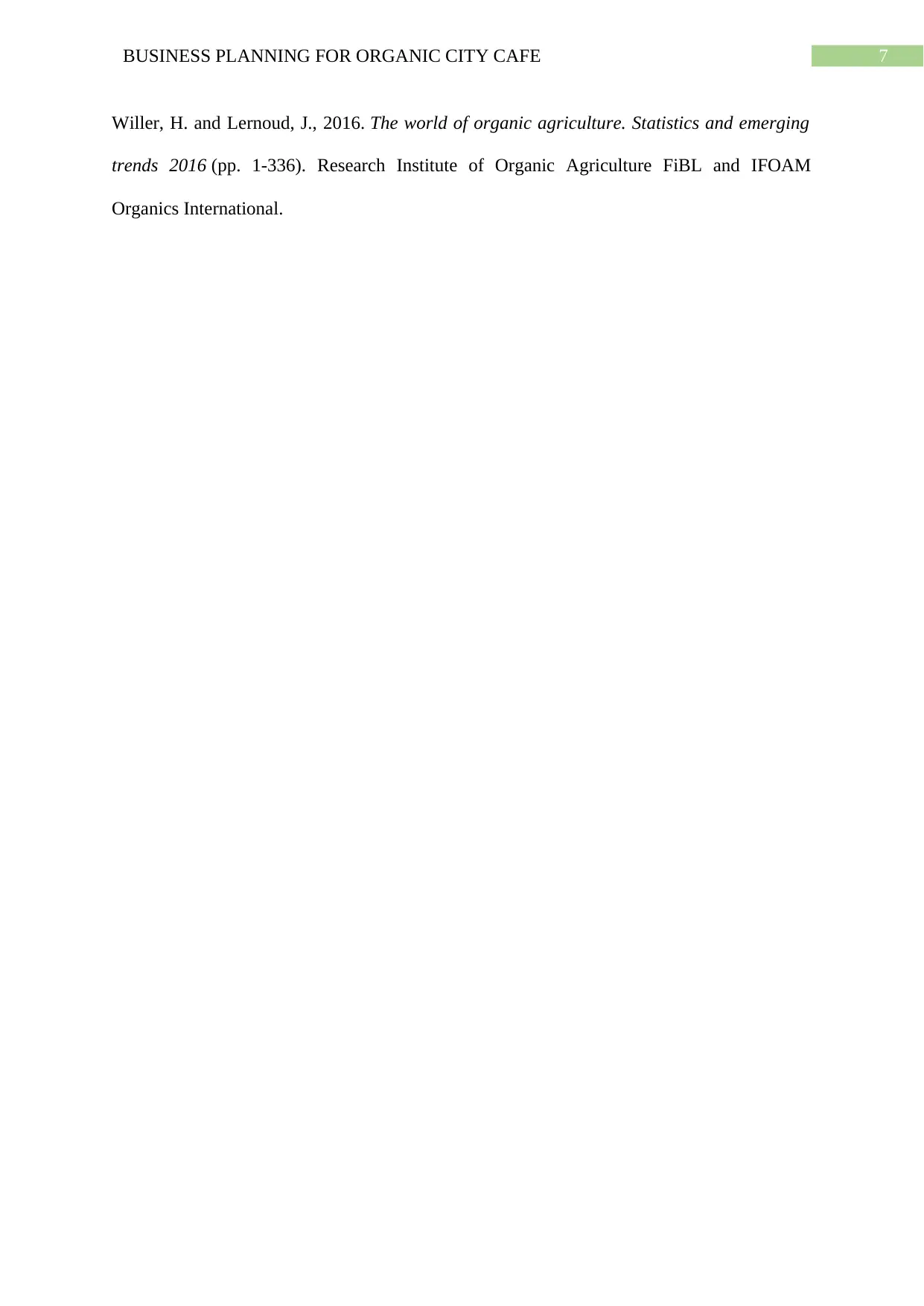
7BUSINESS PLANNING FOR ORGANIC CITY CAFE
Willer, H. and Lernoud, J., 2016. The world of organic agriculture. Statistics and emerging
trends 2016 (pp. 1-336). Research Institute of Organic Agriculture FiBL and IFOAM
Organics International.
Willer, H. and Lernoud, J., 2016. The world of organic agriculture. Statistics and emerging
trends 2016 (pp. 1-336). Research Institute of Organic Agriculture FiBL and IFOAM
Organics International.

8BUSINESS PLANNING FOR ORGANIC CITY CAFE

9BUSINESS PLANNING FOR ORGANIC CITY CAFE
1 out of 10
Your All-in-One AI-Powered Toolkit for Academic Success.
+13062052269
info@desklib.com
Available 24*7 on WhatsApp / Email
![[object Object]](/_next/static/media/star-bottom.7253800d.svg)
Unlock your academic potential
© 2024 | Zucol Services PVT LTD | All rights reserved.
